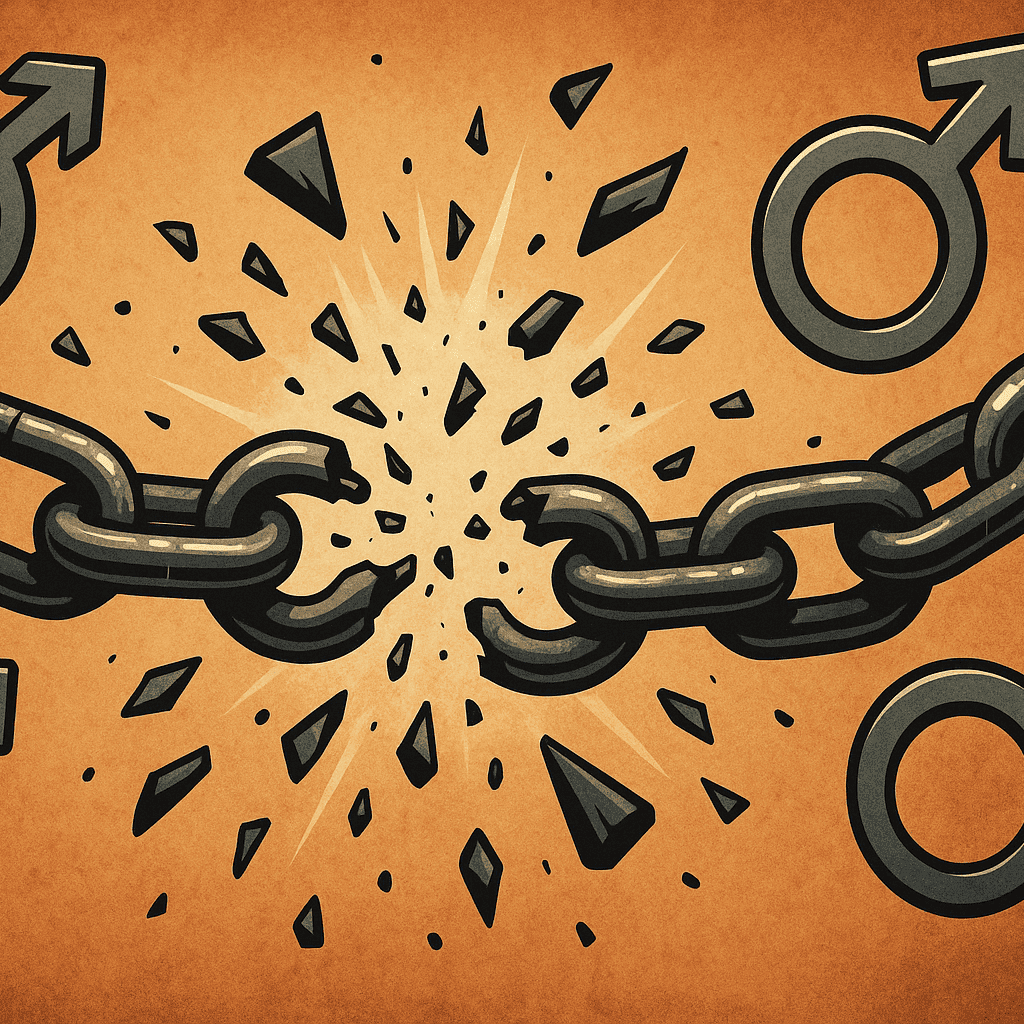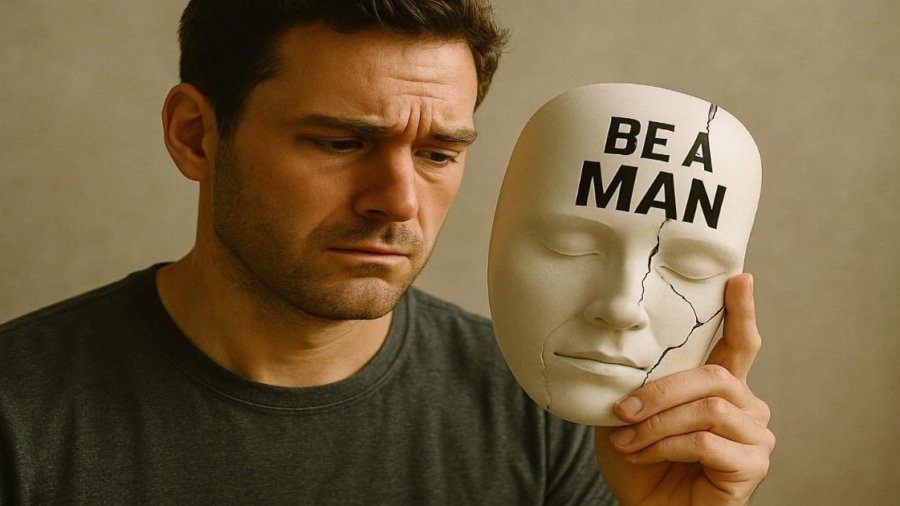The first time I heard someone say to a guy, “Be a man”, I couldn’t help but pause Is that not Toxic Masculinity?
I remember asking myself “Who actually is a man“, “Who really decides what makes someone a man?”, and “Are men not humans too?”. If they are, then what is wrong with them showing their human sides.
That simple command “Be a man” is harmless, or even motivational. But beneath it lies heavy, unspoken assumptions: Be tough. Don’t cry. Don’t seek help. Win. Conquer. Dominate. Endure in silence.
Then I pondered over the term “Toxic Masculinity“
Wait, What do you think of when you read that? Does it not sound like a dangerous man?
But actually, it’s about the destructive cultural norms that dictate what men are meant to be.
This does not hurt men only. It affects their mental wellbeing, destroys their relationships, and drives larger problems in our society. Understanding and addressing toxic masculinity isn’t about blaming men, it’s about freeing all men from ancient expectations so they can build a healthier, more inclusive society.
Understanding Toxic Masculinity
In a world where strength is often equated with silence, and vulnerability is mistaken for weakness, many men find themselves trapped in a rigid mold of traditional masculinity.
Toxic masculinity is a concept that explains societal norms equating masculinity with control, aggression, emotion suppression, and dominance. Toxic masculinity basically talks about the unspoken societal pressure exerted on men to be strong, winners and never let anyone see them being weak.
While masculinity in itself is not toxic, the toxic aspects become apparent when these traits are enforced at the cost of emotional health and relationships.
Key Traits of Toxic Masculinity:
- Emotional suppression
- Promiscuity
- Stoicism
- Aggression and dominance
- Avoiding vulnerability/lessen emotional intimacy.
- Hyper-competitiveness
- Homophobia and misogyny
These tendencies are likely to be reinforced through media, peer interactions, and societal expectations, leading to a cycle that’s challenging to break.
The Psychological Effects on Men
Men adhering to unhealthy masculine norms are prone to depression, stress, and drug dependency. The traditional masculinity ideology has been linked to negative effects on physical and psychological health, including exposure to harmful depression, stress, and drug misuse. (Source)
Consequences Include:
- Emotional Suppression: Leads to difficulty in expressing feelings, resulting in internalised stress and potential outbursts of anger.
- Reluctance to Seek Help: Men tend to avoid seeking mental health help for fear of being perceived as weak. This can aggravate issues like depression and anxiety.
- Increased Risky Behaviours: Use of drugs and alcohol and risky behaviour as coping mechanisms.
Impact on Relationships
Toxic masculinity does not only affects individual men but also strains their relationships with other individuals.
Romantic Relationships:
Men influenced by toxic masculinity often struggle with emotional intimacy, leading to communication breakdowns and unresolved conflicts. A study highlights that such dynamics can result in coercive control, abuse and dissatisfaction within heterosexual relationships (Source).
Friendships:
The emphasis on stoicism and competitiveness can hinder deep, meaningful connections between men, fostering isolation.
Parenting:
Fathers who subscribe to toxic masculine norms have difficulty being affectionate or speaking about their emotions and weakness. Boys, and indeed children in general, can internalise the same corrosive norms that impact their emotional development.
Toxic Masculinity and Society
Beyond personal relationships, toxic masculinity contributes to broader societal issues.
Workplace Dynamics:
At work, toxic masculinity manifests as hyper-competitiveness and dominance, creating hostile work cultures. Such cultures isolate people who fail to identify with these ideologies, influencing productivity and morale overall (Source)
Violence and Aggression:
There is a link between toxic masculinity and increased levels of aggression, such as domestic violence and bullying. Men whose tendencies are toxic are more prone to engage in such acts, perpetuating cycles of abuse.
Public Health Concerns:
Suppression of emotions and reluctance to seek assistance contribute to higher suicide and drug abuse rates in men, raising grave public health concerns.
Why It Affects Everyone, Not Just Men
While men are directly impacted, the ripple effects of toxic masculinity touch all aspects of society.
- Women and Non-Binary Individuals: They are more likely to suffer the adverse effects of aggressive behaviours and systemic inequalities perpetuated by toxic masculine norms.
- Children: They grow up internalising these negative norms, continuing the cycle to future generations.
- Society as a Whole: The society is harmed by more violence, mental health collapses, and tense human relationships because of it.
Debunking Myths About Masculinity
Myth 1: Masculinity Is Strength Through Stoicism
Reality: True strength is in emotional intelligence and being vulnerable.
Myth 2: Men Who Show Emotion Are Weak
Reality: Showing emotions is a sign of self-awareness and resilience, not weakness.
Myth 3: Women Like ‘Real Men’ That Don’t Express Emotion
Reality: Healthy relationships are built on open communication and emotional availability.
Breaking the Cycle: What We Can Do to Redefine Masculinity

1. Start Early: Teach boys that emotions are human, not feminine. Encourage them to talk about their feelings and validate their emotional experiences.
2. Create Safe Spaces for Men: Therapy, support groups and mentorship opportunities allow men to open up freely without judgment.
3. Media Representation: Representations of varied, emotionally open male characters on television, children’s cartoons, and blockbuster films can redefine current stereotypes.
4. Redefine Strength: Strength can be defined by empathy, integrity, and resilience instead of stoicism, aggression, or power.
5. Engage in Conversations: Talk with friends, partners, and co-workers about how masculinity shows up in your life. Awareness is the first step toward change
6.Therapeutic Interventions: Encouraging men to engage in therapy can help shatter harmful beliefs and promote emotional growth.
7. Reforms in Education: Integrating gender norms and emotional intelligence lessons into the curriculum of schools can create more healthier mindsets at an early age.
8. Community Initiatives: Providing safe spaces for men to undergo and redefine discussions of masculinity can lead to mass healing.
Resources and Support
- Books:
- The Will to Change by bell hooks
- Man Enough by Justin Baldoni
- Podcasts:
- The Man Enough Podcast
- The Good Men Project
- Organisations:
Conclusion
Toxic masculinity is more than just a buzzword; it’s a pervasive issue that affects mental health, relationships, and societies.
By recognising and challenging these harmful norms, we can pave the way for a more inclusive and emotionally healthy society. It’s time to redefine what it means to be a man, not through dominance and suppression, but through empathy, vulnerability, and strength in authenticity.



Add a Comment